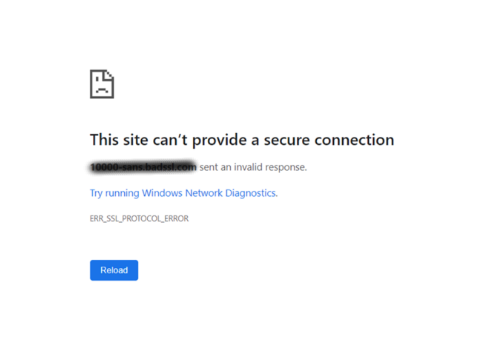Webmasters often complain that they are receiving a Cloudflare ERR_SSL_PROTOCOL_ERROR while visiting their website.
As a part of our Server Management Services, our support Engineers regularly help to fix similar Cloudflare errors.
Let us today discuss some of the possible reasons and fixes for this error.
What causes Cloudflare err_ssl_protocol_error
While accessing websites, users often see an error as shown below:

This error triggers due to a number of reasons that include:
- Wrong DNS settings at Cloudflare
- SSL mode at Cloudflare
- TLS version
- Issues with SSL certificate
Let us now look at the possible steps that our Support Engineers follow to fix this error in different situations.
How to fix Cloudflare err_ssl_protocol_error
Wrong DNS settings at Cloudflare
A common reason for the SSL protocol error that our Support Engineers noticed is wrong DNS settings at the Cloudflare end. This happens when the domain is not fully set to use Cloudflare.
It requires the nameservers of the domain to be changed to that of the Cloudflare one. Often it happens that users forget to remove the non-Cloudflare nameservers after adding the Cloudflare one.
Our Engineers check to see if there are non-Cloudflare nameservers that are conflicting with the assigned Cloudflare name servers.
SSL mode at Cloudflare
Another possible reason for this error is the SSL mode at Cloudflare end.
With Full SSL (strict) SSL mode in Cloudflare end, it can trigger this error when the origin does not have a valid certificate. This could happen when the SSL certificate at the origin server expires, self-signed, or is not issued by a trusted CA
The solution that our Engineers follow here is to temporarily select another SSL option until we have a valid origin certificate in place.
TLS version
TLS version is another possible reason for the SSL protocol error. Transportation Layer Security (TLS) 1.3 protocol provides unparalleled privacy and performance compared to previous versions of TLS and non-secure HTTP.
At times, when there is some conflict with TLS 1.3, our Engineers suggest disabling it to check if they still encounter the error.
Issues with SSL certificate
The ERR_SSL_PROTOCOL_ERROR error sometimes implies it’s a problem with the Cloudflare certificate. This happens when the Free Universal SSL certificate hasn’t yet been deployed.
In such cases, we suggest to (deactivate) Cloudflare so that the website can continue to use your origin’s SSL certificate. Wait 24 hours and (activate) Cloudflare again to see if your SSL certificate has been successfully deployed.
[Need any further assistance in fixing Cloudflare errors? – We’re available 24*7]
Conclusion
In short, the ERR_SSL_PROTOCOL_ERROR appears due to a number of reasons that include wrong DNS settings, SSL mode, TLS version or issues with SSL certificate. Today, we saw how our Support Engineers tackle them.







0 Comments